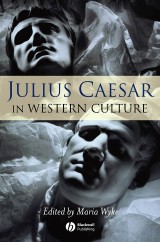Details

Julius Caesar in Western Culture
1. Aufl.
|
44,99 € |
|
| Verlag: | Wiley-Blackwell |
| Format: | |
| Veröffentl.: | 15.04.2008 |
| ISBN/EAN: | 9781405154710 |
| Sprache: | englisch |
| Anzahl Seiten: | 384 |
DRM-geschütztes eBook, Sie benötigen z.B. Adobe Digital Editions und eine Adobe ID zum Lesen.
Beschreibungen
This book explores the significance of Julius Caesar to different periods, societies and people from the 50s BC through to the twenty-first century. <br /> <ul> <li style="list-style: none"><br /> </li> <li>This interdisciplinary volume explores the significance of Julius Caesar to different periods, societies and people.<br /> </li> <li>Ranges over the fields of religious, military, and political history, archaeology, architecture and urban planning, the visual arts, and literary, film, theatre and cultural studies.<br /> </li> <li>Examines representations of Caesar in Italy, France, Germany, Britain, and the United States in particular.<br /> </li> <li>Objects of analysis range from Caesar’s own commentaries on the Gallic wars, through Shakespeare’s Julius Caesar, and images of Caesar in Italian fascist popular culture, to contemporary cinema and current debates about American empire.<br /> </li> <li>Edited by a leading expert on the reception of ancient Rome.<br /> </li> <li>Includes original contributions by international experts on Caesar and his reception.</li> </ul>
List of Illustrations. <p>Notes on Comntributors.</p> <p>Preface and Acknowledgements.</p> <p>Part I Introduction.</p> <p>1. Judging Julius Caesar.</p> <p>Christopher Pelling.</p> <p>Part II Literary Characterization.</p> <p>2. The Earliest Depiction of Caesar and the Later Tradition.</p> <p>Mark Toher.</p> <p>3. Caesar, Lucan's Bellum Civile,and their Reception.</p> <p>Christine Walde.</p> <p>4. Julian Augustus' Julius Caesar.</p> <p>Jacqueline Long.</p> <p>Part III The City of Rome.</p> <p>5. The Seat and Memory of Power: Caesar's Curia and Forum.</p> <p>Riccardo Valenzani.</p> <p>6. St Peter's Needle and the Ashes of Julius Caesar.</p> <p>John Osborne.</p> <p>7. Julius II as Second Caesar.</p> <p>Nicholas Temple.</p> <p>Part IV Nationalism and Statecraft.</p> <p>8. Imitation Gone Wrong: The "Pestilentially Ambitious" Figure of Julius Caesar in Montaigne's Essais.</p> <p>Louisa Mackenzie.</p> <p>9. Manifest Destiny and the Eclipse of Julius Caesar.</p> <p>Margaret Malamud.</p> <p>10. Caesar, Cinema, and National Identity in the 1910s.</p> <p>Maria Wyke.</p> <p>11. Caesar the Foe: Roman Conquest and National Resistance in Freanch Popular Culture. in Fascist Italy.</p> <p>Giuseppe Pucci.</p> <p>Part V Theatrical Performance.</p> <p>12. Julius Caesar and the Democracy to Come.</p> <p>Nicholas Royle.</p> <p>13. Shaw's Caesars.</p> <p>Niall Slater.</p> <p>14. The Rhetoric of Romanita: Representations of Caesar in Fascist Theatre.</p> <p>Jane Dunnett.</p> <p>Part VI Warfare and Revolution.</p> <p>15. From "Capitano" to "Great Commander": The Military Reception of Caesar from the Sisteenth to the Twentieth Centuries.</p> <p>Jorit Wintjes.</p> <p>16. Crossing the Rubicon into Paris: Caesarian Comparisons from Napoleon to de Gaulle.</p> <p>Oliver Benjamin Hemmerle.</p> <p>Afterword.</p> <p>17. A Twenty-First-Century Caesar.</p> <p>Maria Wyke.</p> <p>Bibliography.</p> <p>Index.</p>
“This is reception criticism at its best … Caesar does not invite but rather demands reaction and reflection, a demand admirably met in this collection. Important, influential, and timely deployments of Caesar’s legacy are creatively analyzed here, in essays none of which (I am pleased to say) is afraid of speaking its mind.” <br /> <i>W. Jeffrey Tatum, Florida State University</i> <!--end--> <br /> <p><br /> </p> <p>“An exciting collection of papers by a truly international team of scholars. This richly illustrated and documented volume explores the significance of Caesar’s memory in the discourses of art, literature, nationalism, and empire.”<br /> <i>Christina S. Kraus</i><i>, Yale University</i><br /> </p> <p>"A fascinating read which should appeal to a wide variety of readers not just in the classics, but throughout the humanities."<br /> <i>Bryn Mawr Classical Review</i><br /> <br /> </p> <p>"There is a remarkable diversity of discipline and methodology – not to mention nationality – on display here, and it reflects well on (Wykes’) choice of contributors and unintrusive editorial style."<br /> <i>Llewelyn Morgan, Brasenose College, Oxford</i><br /> </p> <p>"Appealing both to a reader possibly unfamiliar with the material, but also being of much interest to fellow specialists in this field." <i>Scholia Reviews</i></p>
<b>Maria Wyke</b> is Professor of Latin at University College London. She is author of <i>Projecting the Past: Ancient</i> <i>Rome, Cinema and History</i> (1997) and <i>The Roman Mistress: Ancient and Modern Representations</i> (2000), and is now working on her next publication <i>Caesar: A Life in Western Culture</i> (2006).
Julius Caesar is not only the most famous Roman of them all. He has also been surprisingly relevant in many different periods, for many different societies and people. Edited by a leading expert on the reception of ancient Rome, this interdisciplinary volume examines Caesar’s role in Western culture across a wide chronological range and diverse media. <br /> <p><br /> </p> <p>Ranging over the fields of religious, military, and political history, archaeology, architecture and urban planning, the visual arts, and literary, film, theatre and cultural studies, contributors examine the Caesars of Italy, France, Germany, Britain, and the United States. Their objects of analysis extend from Caesar’s own commentaries on the Gallic wars composed in the 50s bce through Shakespeare’s Julius Caesar, on to images of Caesar in twentieth-century Fascist Italy’s popular culture right up to contemporary cinema’s Caesar and twenty-first century debates about American empire.<br /> </p> <p><br /> </p>
“This is reception criticism at its best … Caesar does not invite but rather demands reaction and reflection, a demand admirably met in this collection. Important, influential, and timely deployments of Caesar’s legacy are creatively analyzed here, in essays none of which (I am pleased to say) is afraid of speaking its mind.”<br /> <i>–W. Jeffrey Tatum, Florida State University</i><!--end--> <p>“An exciting collection of papers by a truly international team of scholars. This richly illustrated and documented volume explores the significance of Caesar’s memory in the discourses of art, literature, nationalism, and empire.”<br /> <i>–Christina S. Kraus</i><i>, Yale University</i></p> <p>"There is a remarkable diversity of discipline and methodology – not to mention nationality – on display here, and it reflects well on (Wykes’) choice of contributors and unintrusive editorial style."<br /> <i>–Llewelyn Morgan, Brasenose College, Oxford</i></p>
















